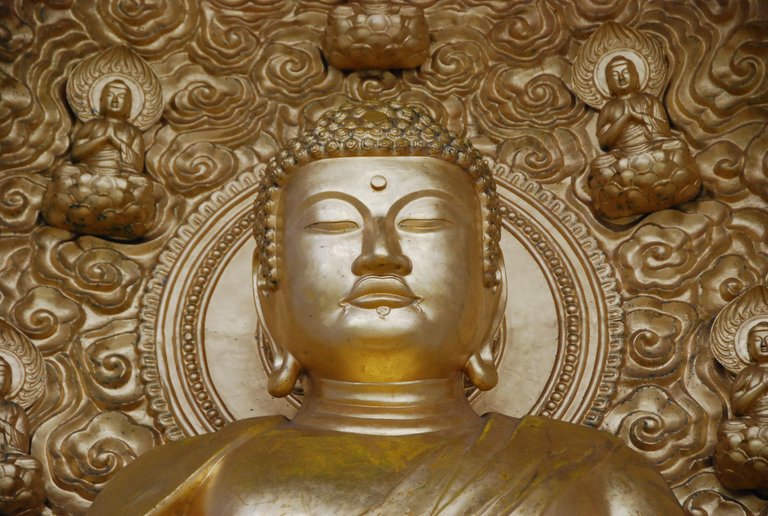
In the last essay on compassion toward our loved ones we saw that we understand that the defilements and the kleshas which are the negative seeds that we carry within us as human beings are in others as well as ourselves and that we are all the same inside. We also saw the ease with which slowly engage in this process as to not arouse too many negative states by positively regarding the ones we love in meditation. By taking it easy in this way we prepare our minds to move in in the process toward people to whom we feel neutral. So we have it, it is in every one of us and just that bit of knowledge can lead us on the path of compassion, and is the second stage of metta-bhavana which again is:
- Understanding the defilements and working to overcome them
- Toward ourselves
- Toward our loved ones
- Toward people to whom we feel neutral
- Toward those with whom we are having conflicts
- Toward all sentient beings

Photo by Ben White on Unsplash
In this stage we are exercising our compassion muscle. We are also on the path to being wise because as we progress in regarding others with lovingkindness as we have regarded ourselves we realize that we don’t become people pleasers and we don’t put others before ourselves. While we learn to appreciate ourselves first we develop a respect and compassion for others and a reverence for their experience as suffering and struggling with the same kleshas but in that knowing we are wise in how we interact with others. Internally we wish the best for others even if we aren’t engaging with them directly. This is at the heart of what this practice means. We don’t have to like what someone is doing or even like them as long as we don’t make a big deal out of it. We include them in our practice because we want all beings to be liberated from suffering. We do not want suffering for anyone and with this in mind we are able to want all good things for all beings. As we strengthen this within ourselves we can express it in simple ways like courtesy and kindness and have a powerful effect.

Photo by Pietro Jeng on Unsplash
Cultivating Metta Towards Someone To Whom We Are Neutral and Neuroscience
This stage gives us the opportunity to practice because most people we meet all day long are people we feel neutral to. The mail delivery person, the pizza maker, the grocery clerk and so on. We set our posture in meditation and begin to set the intention to regard people we have see all day long on the street and run into that we usually ignore. This is a very important turn in the practice because we are expanding our ability to open our hearts and literally we rewiring our brains.
In 2016 US News & World Report did a story on a scientific study at the University of Wisconsin-Madison found that the brain’s circuitry that is used to detect emotions and feelings, including empathy, we changed in people who had extensive experience in practicing compassion meditation scanning the brain using functional magnetic resonance imaging.
The study measured changes in brain responses using functional magnetic resonance imaging (fMRI) before and after training. In the MRI scanner, participants viewed images depicting human suffering, such as a crying child or a burn victim, and generated feelings of compassion towards the people using their practiced skills. The control group was exposed to the same images, and asked to recast them in a more positive light as in reappraisal.
The researchers measured how much brain activity had changed from the beginning to the end of the training, and found that the people who were the most altruistic after compassion training were the ones who showed the most brain changes when viewing human suffering. They found that activity was increased in the inferior parietal cortex, a region involved in empathy and understanding others. Compassion training also increased activity in the dorsolateral prefrontal cortex and the extent to which it communicated with the nucleus accumbens, brain regions involved in emotion regulation and positive emotions. University of Wisconsin-Madison Center for Healthy Minds
They have developed guided meditations that you can sign up for receive for free here: Compassion Training

Photo by Evan Kirby on Unsplash
Moving Toward a More Compassionate World
As the scientific community corroborates the results of lovingkindness practice and it become more and more a part of treatment and methods to help people reduce suffering as in judgment and feelings of separation we can see the positive impact this can have on our day to day lives. It is very encouraging that the mindfulness fad is deepening into investigating how compassion is essential for our health, well being and ultimately our communities and our world. Imagine a world where children are taught this type of emotional regulation and cultivating empathy and compassion. Bullying would be a thing of the past. We can see that what we are really talking about here is the meaning we assign to being human and instead of looking at it like adopting a new religion. Buddhism is the science and philosophy of optimizing the human experience.
What do you think?
Recent Posts
Creative Problem Solving Through Meditation
Making Mindfulness Meditation Work For You – Part 1
Making Mindfulness Meditation Work For You Part 2 - The Noble Eightfold Path - Right View
Making Mindfulness Meditation Work For You Part 3 - The Noble Eightfold Path - Right Thought
Making Mindfulness Meditation Work For You Part 4 - The Noble Eightfold Path - Right Speech
Making Mindfulness Meditation Work For You Part 5 - The Noble Eightfold Path – Right Action
Making Mindfulness Meditation Work For You Part 6 - The Noble Eightfold Path – Right Livelihood
Making Mindfulness Meditation Work For You Part 7 - The Noble Eightfold Path – Right Effort
Making Mindfulness Meditation Work For You Part 8 – The Noble Eightfold Path – Right Mindfulness
Making Mindfulness Meditation Work For You Part 9 – The Noble Eightfold Path – Right Concentration
Making Mindfulness Meditation Work For You – The Noble Eightfold Path Part 10 – Ethics, Compassion and Wisdom
Meditation and Buddhism - What is Compassion?
Meditation and Buddhism - What is Compassion? - Part 2 - The Three Poisons
Meditation and Buddhism – What is Compassion? – Part 3 – Toward Ourselves
Meditation and Buddhism – What is Compassion? – Part 4 – Toward Our Loved Ones

@soulsistashakti is a musical artist and writer based in NYC as well as a practitioner of Buddhist teachings. You can check out my music on my FB artist page at https://www.facebook.com/soulsistashakti
You fallow Buddhism? I’m in china there’s lot of beautiful temples and there’s lots of peace if we go there when I feel so sad I visit there
Yes I do, I practice it to the best of my ability. This series on lovingkindness practice is one of the most important ones in regards to becoming free from suffering. I would love to go to China, Japan, Vietnam and other places that have beautiful temples that pay homage to their styles of Buddhism.
Important to always remember the true temple is the mind. Thank you for stopping by. xoxo
Dhekain ay koi lavnr di shay hay.thanks